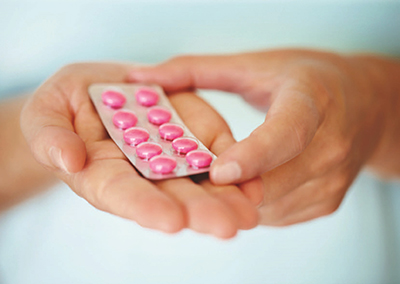Patient Management Program
When we receive your prescriptions, our staff will enroll you in our free program.
Our Patient Management Program includes:
- Education about how and when to take your medication.
- How to manage possible side effects.
- Clinical evaluation and support.
Your participation is completely voluntary. If you do not wish to participate in the patient management program, please let us know. If you would like to use another specialty pharmacy, please call us and we will assist you with the transfer of your prescription.

Refilling a Prescription
You may order refills in person, by phone, or by email:
Refill in Person
420 S 5th Avenue
West Reading, PA 19611Enter the 5th Avenue hospital entrance through revolving door. Turn to your right and the pharmacy is at the end of the foyer.
Refill by Phone
Calling our specialty team at 833-739-0044. Please allow two (2) business days for Reading Hospital Ambulatory Pharmacy to process and deliver your refill order.
Refill by Email
Email one of our specialty pharmacists at rhspharmacy@towerhealth.org
Lost Supplies and Travel Needs
If you have lost your medication or supplies, or if you need your prescription(s) in advance of travel, give us a call. We will work with you and your insurance company to be sure that your medications are covered and that there is no lapse in therapy.
Services Offered
Insurance, Billing, and Financial Assistance
- Copays: Our team works with your insurance company to help get your specialty prescription covered. You may have to pay a copay each time a medicine is filled. We will tell you the exact amount you need to pay. The copay amount for a specialty pharmacy medication may still be high even if your insurance company pays for most of the cost. Our team will look for various financial assistance programs available to help lower your cost. We may ask you to fill out a patient medication assistance program authorization form in order to provide these services. We will provide you with the cash price of your medication, upon request.
- Prior Authorization: Some medicines need extra information for costs to be covered. This process is called a prior authorization. Our team can process this paperwork. It may take a few business days to complete. Our team keeps you and your doctor informed throughout the process, especially if there are expected delays. If insurance denies coverage for your medicine, our team can help your doctor file an appeal.
- In Network?: If your insurance plan considers Reading Hospital Ambulatory Pharmacy an “out of network” pharmacy, we will inform you of the cost to fill your medicine with us in writing. Our staff will transfer your prescription to an “in network” pharmacy if there is a cost savings to you.
Payment Plans
We accept credit/debit cards, cash, personal checks, money orders and most flexible spending accounts.
If you need help in arranging a payment plan for the money you owe, we will be happy to assist you in setting up a payment plan. Please call us so we can help.
Pharmacist Help
Reading Hospital Ambulatory Pharmacy specialty pharmacists are trained on the medication you are taking. They are here to answer your questions about your therapy and care plan. Our pharmacists have direct access to your doctors, nurses, and other providers, and will reach out to them if needed.
Pharmacists will:
- Teach you how to take your medicine correctly and consistently and share why it’s important.
- Make sure that you know how to use injectable medications.
- Help you understand and manage side effects and drug interactions.
- Discuss any problems you may have, such as administration difficulties or cost concerns.
- Work with your health care team to be sure your therapy is safe, effective and appropriate.
- Provide you with tools to manage your therapy, including education materials and consumer advocacy support.
Please call one of our pharmacists if you have any questions about your treatment. A licensed pharmacist is available 24 hours a day, 7 days a week for any urgent needs relating to your medication.
After Normal Business Hours
After normal business hours, your call will be forwarded to an on-call pager. Please leave your 10-digit call-back number and a pharmacist will promptly return your call, within no more than 30 minutes. In case of an emergency call 9-1-1.
Home Delivery Available
A free delivery can be scheduled right to your home. Delivery is available Monday through Friday. A signature is required by the person receiving the medication. We are not able to deliver to a PO Box. Our team will coordinate delivery of your specialty medication(s) to your home or an approved alternate location if needed.
Supplies Included
We will include any needed supplies, such as needles, syringes, sharps containers and alcohol swabs, at no cost to you. If your medication(s) require special handling or refrigeration, they will be packaged accordingly.
Contacting You
We will make every effort to deliver your medication and supplies early if a weather warning is in place. A Reading Hospital Ambulatory Pharmacy team member will attempt to call you, with any special instructions.
Please make sure we have your secondary contact information on file. That way we can reach you in case of an emergency or a delivery delay. In addition, please let our staff know if your contact information changes.
Refill Reminders
A patient care coordinator or pharmacy technician will call you:
- One (1) week before your medication is scheduled to run out
- To check your progress
- To determine the shipment or delivery of your next refill
- To verify your therapy and get a new prescription if you do not have any refills left.
Our patient care coordinator or pharmacy technician will connect you to a clinical pharmacist if you have any questions or concerns about your therapy.
Interpreter Services
If you are deaf, hearing impaired or if English is not your primary language, an interpreter is available. There are special services available if you are visually impaired as well.
Medications Not Available at our Pharmacy
Reading Hospital Ambulatory Pharmacy has access to most specialty medicines. but if our specialty pharmacy is unable to provide your medicine, our team works with both you and another pharmacy to ensure that you receive your medicine.

Patient Information
Drug Recalls
Reading Hospital Ambulatory Pharmacy follows the drug recall guidelines by the FDA, the drug manufacturers and/or state and federal regulatory agencies. We contact you and your provider if a drug recall affects you.
Accessing Medications in the Event of Emergency or Disaster
We make every effort to deliver your medicines and supplies early if there is a weather event. If we are unable to deliver your medicines or supplies, we transfer your prescription to another pharmacy. If there is a disaster in your area, and you are displaced, call 833-739-0044 to tell us where to deliver your medicine. Be sure to let us know when you return to your home. Make sure your contact information on file is up to date to avoid delay or disruption in your therapy.
Patient Safety
Adverse Drug Reactions
If you have adverse drug reactions, a sudden change in your medical condition or other problems contact your primary care provider (PCP), local emergency room, or call 9-1-1.
Hand-Washing Instructions
Infections are serious. The best way to make sure you do not get an infection is to wash your hands often. Remember to always wash your hands before and after you prepare or handle any medication.
- Collect the supplies:
- Soap
- Paper towels or a clean cloth towel
- Wet your hands with warm water.
- Place a small amount of soap on your hands.
- Rub your hands briskly together for at least 30 seconds.
- Don’t forget the in-betweens of your fingers and your thumbs.
- Rinse your hands with warm water.
- Dry your hands with a paper towel or clean cloth towel.
- Turn the faucet off with the towel.
- If you touch anything (your hair, for example), sneeze into your hands or feel that your hands may no longer be clean, wash your hands again before continuing with your care.
If no water supply is available, use an alcohol-based antibacterial hand cleanser.
Sharps and Sharps Disposal
After using your injectable medication, place all needles, syringes, lancets and other sharp objects used with giving the medicine into a sharps container. Do not dispose of sharps in the trash unless they are contained within a sharps container. Do not flush them down the toilet. If a sharps container is not available, a hard plastic or metal container with a screw-on top or other tightly securable lid could be used. Before discarding, reinforce the top with heavy-duty tape. Do not use clear plastic or glass containers. Containers should be no more than three-quarters full when you throw it away.
Check with your local waste collection service or public health department to verify the disposal procedures for sharps containers in your area. You can also visit the Centers for Disease Control and Prevention (CDC) Safe Community Needle Disposal website at www.cdc.gov/needledisposal.
Needle-Stick Safety
- Never replace the cap on needles.
- Throw away used needles immediately after use in a sharps disposal container.
- Plan for the safe handling and disposal of needles before using them.
- Report all needle sticks or sharps-related injuries promptly to your provider.

Patient Information on Emergency Preparedness
We want you and your family to live in a safe environment. We have provided some suggestions that could help you prevent an injury within your home. Check every room in your house and make your home safer.
Falling
(This is the way people are most often injured in their homes.)
- Keep the floor clean. Promptly clean up spills.
- If you use throw rugs, place them over a rug liner or choose rugs with non-skid backs to reduce your chance of falling.
- Use a non-slip mat or install adhesive strips in your tub or shower.
- Tuck away telephone, computer and electrical cords out of walkways.
- All stairs and steps need handrails. If you have stairs in your home and have children, use baby gates at the top and bottom of the stairs.
- Have all walkways well-lit and use night lights as needed.
- Have a flashlight that works.
Poisoning
- Keep all hazardous materials and liquids out of the reach of children.
- Keep medications out of the reach of children.
- Know your local poison control number or dial 800-222-1222 if a poisoning occurs.
Fire and Burn Prevention
- Have smoke detectors in the home and replace the batteries at least once a year.
- Test each smoke detector once a month.
- Have a fire plan and be sure all family members know what to do if there is a fire.
- Place covers over electrical outlets.
- Check to make sure your water heater is set no higher than 120 degrees Fahrenheit.
- Keep children away from the stove and never leave the stove unattended while cooking.
- Keep matches and lighters out of the reach of children.
Fire
- Rescue anyone from immediate danger.
- If you are safe, alert the fire department. Otherwise evacuate the area.
- Turn off oxygen (if applicable) and try to contain the fire by closing off any access, such as doors.
- Attempt to extinguish the fire only if it is in a small localized area, otherwise evacuate the building and notify the fire department once you are safe.
- If relocation is necessary, please call Reading Hospital Ambulatory Pharmacy to alert us to your updated contact information and new medication delivery location to ensure that there is no lapse in therapy.
Natural Disasters (food, earthquake, or tornado)
- In disaster-prone areas, store food and extra bottled water. Have a battery-operated radio, flashlights and extra batteries. If you are on a nebulized medication or other medication that requires electricity to administer, please call your local electric company to report your special needs. They may be able to prioritize the restoration of your electricity.
- Check all people in the household for injuries.
- Check your home for any gas or water leaks and turn off appropriate valves.
- Stay away from windows or broken glass. Wear shoes at all times.
- Evacuate the area if necessary.
- If evacuation is necessary, go to the nearest shelter and notify the organizers of any special needs you have. Please call Reading Hospital Ambulatory Pharmacy to alert us to your updated contact information and new medication delivery location to ensure that there is no lapse in therapy.
Power Outage
- Notify your gas and electric companies if there is a loss of power. If you are on a nebulized medication or other medication that requires electricity to administer, please call your local electric company to report your special needs. They may be able to prioritize the restoration of your electricity.
- Have a battery-operated radio, flashlights, batteries and/ or candles available. (If you are on oxygen, turn it off before lighting candles.)
Winter Storm
- Prepare an emergency kit with:
- Water
- Nonperishable food
- Battery-operated radio
- Flashlights and fresh batteries
- First-aid kit, including prescription medicines
- Keep a full charge in your cell phone.
- Do NOT use your stove for heat. If your power goes out, use these items as heat sources:
- Extra blankets, sleeping bags or warm winter coats, gloves and hats.
- A wood-burning fireplace. (Be sure to keep a supply of dry firewood.)
- Never use a charcoal grill or portable gas camp stove inside your home. Both items produce deadly fumes.
- Avoid using candles as they can lead to house fires. If you do use candles, never leave lit candles unattended.

Concerns and Complaints
Patient Complaint Policy
You have a right to voice grievances and recommend changes in care or services without fear of revenge or unreasonable interruption of services. There are several ways for you to inform us of your comments or concerns.
- Share the concern with staff or the pharmacy manager, either by phone or in person.
- Email us at rhspharmacy@towerhealth.org.
Reading Hospital Ambulatory Pharmacy is accredited by the Accreditation Commission for Health Care, Inc. (ACHC). You may also make a complaint to ACHC’s Complaints Department by calling 855-937-2232 or visiting their website www.achc.org/contact.
Reading Hospital Ambulatory Pharmacy has a formal complaint process that ensures your concerns, complaints and suggestions are reviewed and investigated within five (5) business days of receipt. You are notified, either by phone or in writing, of our resolution. There is no retaliation for fling a complaint.
If you are unsatisfied with the resolution of the complaint:
- The next level of management will be notified progressively until the complaint is resolved, and/or
- Pharmacy staff will assist you by providing contact information for the Pennsylvania Board of Pharmacy, or your health insurance plan.
